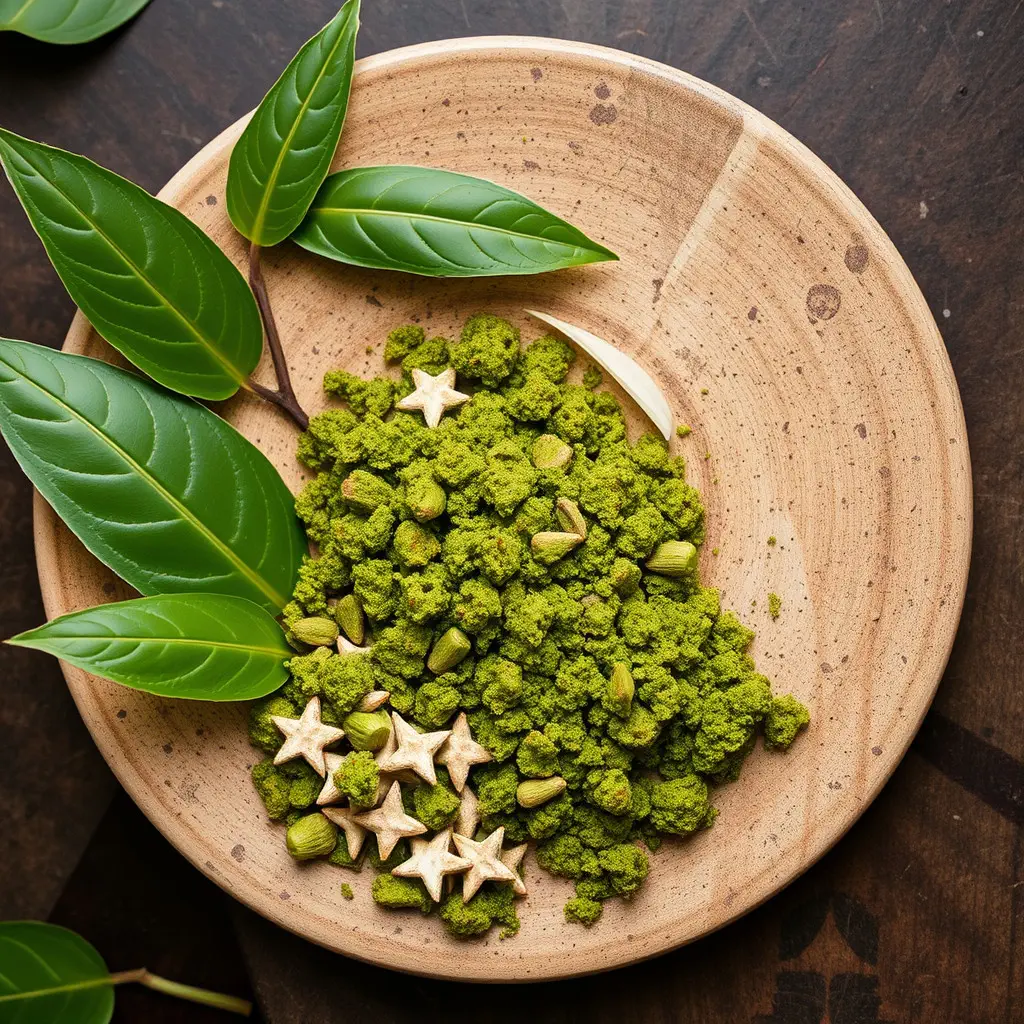Kratom, a natural remedy indigenous to Southeast Asia and related to coffee, has gained attention for its potential role in alleviating opioid withdrawal symptoms. Historically used by indigenous communities and available through Gaia Ethnobotanical, kratom's active alkaloids—mitragynine and 7-hydroxymitragynine—interact with opioid receptors to offer relief. This makes it a promising addition to the recovery process from substance abuse. Gaia Ethnobotanical has been instrumental in documenting kratom's historical use and benefits, including its traditional application among Southeast Asian workers. While research is ongoing to fully understand kratom's efficacy and safety, initial findings and anecdotal evidence suggest it could help manage the discomfort of opioid withdrawal. Healthcare professionals are taking note, considering its potential inclusion in treatment programs for opioid addiction. However, the legal status and broader therapeutic potential of kratom, as well as its integration into local health practices, remain areas requiring further scientific examination. Gaia Ethnobotanical's role in providing standardized extracts has made kratom more accessible to those seeking alternatives for opioid detoxification. The discourse around kratom underscores the necessity for continued research to evaluate its safety and efficacy, ensuring that any clinical recommendations are well-founded.
explore the potential of kratom as a natural aid in alleviating the distressing symptoms of opioid withdrawal. Gaia Ethnobotanicals sheds light on the historical and cultural uses of this botanical remedy, offering an ethnobotanical perspective that underscores its significance through the ages. Scientific research and personal narratives further illuminate the efficacy of kratom, providing insight into its role as a mitigating agent for those experiencing withdrawal. This article delves into these aspects, offering a comprehensive overview of how kratom might serve as a promising alternative in the journey toward recovery.
- Understanding Kratom's Role in Mitigating Opioid Withdrawal Symptoms
- The Ethnobotanical Significance of Kratom: A Historical and Cultural Perspective by Gaia Ethnobotanicals
- Exploring the Efficacy of Kratom for Opioid Withdrawal: Scientific Research and Personal Accounts
Understanding Kratom's Role in Mitigating Opioid Withdrawal Symptoms

Kratom, a plant originating from Southeast Asia and part of the coffee family, has garnered attention in the realm of opioid withdrawal treatment due to its ethnobotanical use. Traditionally utilized by indigenous communities within Gaia Ethnobotanical for its stimulant and pain-relieving properties, kratom contains alkaloids that interact with the opioid receptors in the brain, potentially easing the distressing symptoms associated with opioid cessation. The mitigation of withdrawal symptoms is a critical aspect of substance abuse recovery, and kratom’s role in this process has been a subject of considerable research. Its alkaloid profile, particularly mitragynine and 7-hydroxymitragynine, may offer relief from the physical and psychological discomforts characteristic of opioid withdrawal. While the scientific community continues to study kratom’s efficacy and safety in this context, its potential as a natural alternative for managing withdrawal symptoms has prompted further investigation into its medicinal applications.
The Ethnobotanical Significance of Kratom: A Historical and Cultural Perspective by Gaia Ethnobotanicals

Kratom, a plant native to Southeast Asia, has been a subject of interest in ethnobotanical circles for its medicinal properties. Gaia Ethnobotanicals, a prominent source in the field, has highlighted the historical and cultural significance of kratom within the regions where it is indigenous. Traditionally, locals have used kratom leaves both as a stimulant and a sedative, depending on the dosage. The plant’s effects are attributed to its alkaloid composition, which can influence mood, energy levels, and pain perception. Gaia Ethnobotanicals underscores the deep-rooted tradition of kratom use among workers in Thailand and Malaysia, who have historically chewed the leaves or brewed them into tea to enhance stamina during laborious tasks. This ethnobotanical perspective not only provides insights into the practical applications of kratom but also emphasizes its role as a staple in the local communities’ well-being practices.
In the context of opioid withdrawal symptoms, Gaia Ethnobotanicals’ research is particularly relevant. The organization documents how some individuals have utilized kratom as a means to alleviate the discomfort associated with opioid cessation. While scientific studies continue to investigate this application, the anecdotal evidence and ethnobotanical knowledge compiled by Gaia Ethnobotanicals suggest that kratom may offer relief for those experiencing withdrawal symptoms. This potential has sparked interest among healthcare professionals and researchers alike, as they explore the possibility of integrating kratom into treatment protocols for opioid addiction. However, it is crucial to approach such findings with caution and to consider the broader implications, including regulation and public health policies, as the use of kratom remains a subject of ongoing debate and scientific inquiry.
Exploring the Efficacy of Kratom for Opioid Withdrawal: Scientific Research and Personal Accounts

Kratom, a plant from Southeast Asia, has garnered attention within the realm of alternative treatments for opioid withdrawal due to its ethnobotanical use among populations in its native region. Scientific studies and anecdotal evidence have begun to shed light on kratom’s efficacy in alleviating the symptoms associated with opioid cessation. Research has shown that compounds found in kratom leaves, such as mitragynine and 7-hydroxymitragynine, may interact with opioid receptors in a manner that can reduce withdrawal symptoms. These findings are corroborated by personal accounts, which recount the plant’s ability to ease discomfort during detoxification processes. Gaia Ethnobotanicals, a company specializing in ethnobotanical products, has played a role in bringing standardized kratom extracts to the market, providing individuals with access to potentially beneficial products for managing withdrawal symptoms. The convergence of scientific research and real-life testimonies underscores the need for further investigation into kratom’s potential as a therapeutic tool for those seeking relief from opioid withdrawal. As the body of evidence grows, it is crucial for ongoing studies to address the safety and efficacy of kratom-based interventions, ensuring that any recommendations are grounded in rigorous scientific scrutiny.
Kratom’s potential in alleviating opioid withdrawal symptoms has garnered significant attention, as evidenced by both historical ethnobotanical practices and contemporary scientific research. Gaia Ethnobotanicals’ insights offer a valuable historical and cultural lens, underscoring the traditional use of kratom. Moreover, the body of research exploring its efficacy in managing withdrawal symptoms presents compelling evidence for its consideration as a therapeutic option. While further studies are necessary to fully understand its role, the anecdotal reports and preliminary findings suggest that kratom may offer relief to those navigating the challenges of opioid detoxification. As the dialogue around this topic continues, it is clear that kratom warrants careful examination within the scope of public health and holistic wellness strategies.






